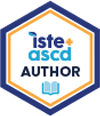Elevate Student Projects with AI: A Live ChatEDU Podcast Experience
,
HBGCC - Innovation Arcade - Exploration Lab B, Table Table 1
Session description
Outline
Introduction and Overview (10 minutes)
Content: Introduction of ChatEDU cohosts, a brief overview of the podcast’s focus on AI in K-12 education, and the specific topic of using AI in Personal Interest Projects.
Engagement: Welcome audience members, encourage them to think about their experiences with student projects, and invite them to participate in the session actively. Use a quick audience poll via a live Mentimeter to gauge familiarity with AI and student-driven projects.
Exploring Personal Interest Projects and AI (15 minutes)
Content: Explanation of Personal Interest Projects, highlighting how AI can be used to support brainstorming, conducting SWOT analyses, creating timelines, and finding resources. Share examples of AI-driven projects and how they elevate student engagement and creativity.
Engagement: Encourage peer-to-peer interaction with a “Think-Pair-Share” activity where participants discuss potential applications of AI in their classrooms.
Live Demonstration of AI Tools in Action (10 minutes)
Content: Live demonstration of AI tools used in Personal Interest Projects, such as an AI assistant guiding a project from idea generation to execution.
Engagement: Invite audience members to suggest project ideas and demonstrate how AI can refine these ideas on the spot, showing its role as a mentor and resource curator. Interactive Q&A during the demo to allow attendees to ask questions and suggest alternate scenarios, keeping the session dynamic and responsive.
Discussion on Equity and Accessibility (10 minutes)
Content: Discussion on the importance of AI in leveling the playing field and ensuring equitable access to technology for all students. Highlight how AI democratizes learning and bridges opportunity gaps.
Engagement: Open the floor for audience reflections on how AI could impact students from marginalized backgrounds in their settings.
Audience Q&A and Interactive Feedback (10 minutes)
Content: Open Q&A session where attendees can ask specific questions about implementing AI in Personal Interest Projects.
Engagement: Encourage audience members to share their insights, ask questions, and interact directly with the cohosts.
Wrap-Up and Key Takeaways (5 minutes)
Content: Summarize the key points discussed, including the benefits of integrating AI into student-driven projects and the importance of equity in technology access.
Engagement: Highlight actionable steps attendees can take to start using AI in their classrooms immediately.
Process: Conclude with a call-to-action, inviting attendees to continue the conversation on social media or via the podcast’s platforms.
Supporting research
Co-Intelligence by Ethan Mollick
Brave New Words by Sal Khan
PBL World
Dr. Rose Luckin
Presenters


Session specifications
Topic:
Grade level:
Audience:
Attendee devices:
Attendee device specification:
Laptop: Chromebook, Mac, PC
Tablet: iOS, Windows, Android
Participant accounts, software and other materials:
Subject area:
ISTE Standards:
Designer
- Design authentic learning activities that align with educational standards and use digital tools and resources to maximize learning.
Empowered Learner
- Set learning goals, develop strategies leveraging technology to achieve them and reflect on the learning process to improve learning outcomes.
- Use effective research strategies to find resources that support their learning needs, personal interests and creative pursuits.

 Back
Back Trips and Tours
Trips and Tours